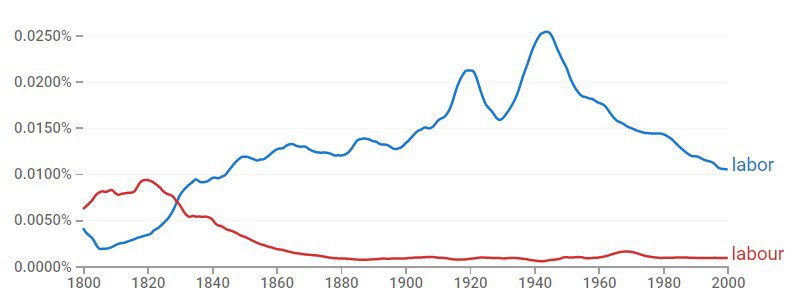There is no difference in meaning between labor and labour. Labor is the preferred spelling in American English, and labour is preferred throughout the rest of the English-speaking world. One exception: In Australia, the American spelling is used in reference to the Australian Labor Party. In all other contexts, Australians use labour. This idiosyncrasy results from the influence of the American labor movement on the founders of the Australian Labor Party. The British Labour Party has the u.
Though labor is now the American spelling, the form is many centuries old. The Oxford English Dictionary lists examples from as long ago as the 1400s, predating the development of American English by several centuries. It remained the less common spelling, though, until the Americans made it their preferred form early in the 19th century.
The switch from -our spellings to -or spellings was one of the major early developments in American English. Many distinctively American (or North American, in some cases) spellings weren’t settled until the second half of the 19th century or even later. But labor, along with many other -or words, became the prevalent spelling in the U.S. around 1840. This ngram, which graphs the use of labor and labour in American books published from 1800 to 2019, renders the story visually:
Examples
U.S
Applications fell last week to a seasonally adjusted 383,000, reinforcing confidence that the labor market is on track to recovery. [Los Angeles Times]
Efforts to jump-start N.F.L. labor talks seem to have stalled. [New York Times]
U.K., Canada
Initial jobless claims fell by 36,000 to 383,000, the labour department said on Thursday. [Financial Times]
Ottawa is mulling ways to tap into the U.S. labour force as worker shortages loom on our side of the border. [CTV.ca]
Australia
Demand for skilled labour softened in the final three months of 2010. [The Age]
NSW Labor MP Angela D’Amore is to appeal against a corruption finding that she rorted staff expense claims. [Sydney Morning Herald]

Comments are closed.